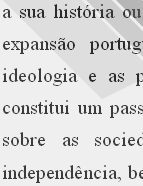

................................
Resorting to physical anthropology thus restricted the effective scope of the gaze cast on the Other. Reduced to the condition of a great ape, the African was expelled from human value considerations. His life was thus drained of historical marks, the "savage" of today's colonial era being the exact reproduction of the "savage" of time immemorial. How could anyone believe in the possibility of organising any scientific explanation, since the continent, which did not know writing - except on its northern shore from where the great Egypt had already been 'removed' to integrate the space of universal history - appeared to be populated by an extreme savagery that encompassed men, animals, and nature?
To accomplish the task of knowledge production, the frontier separating the "savages" from the "civilised" needed to have a scientific basis that only experts in physical anthropology could provide. Oliveira Martins’ proposals became the anthropological creed of Portuguese intelligentsia, which unleashed a systematic reflection drawing attention to the urgent need to promote the study, teaching and knowledge of the colonies capable of introducing rationality into politics and safeguarding national interests in Africa, the space that gave consistency and dimension to the Portuguese empire. Against this backdrop, the Sociedade de Geografia de Lisboa [Lisbon Geographical Society] (SGL) was founded in late 1875 to undertake this task. Jaime Batalha Reis, Andrade Corvo and Luciano Cordeiro were the core structure of the SGL, Cordeiro having proposed the establishment of the Escola Colonial [Colonial School] in Lisbon as it was called in 1906, aimed at training specialised senior staff to ensure a rational administration of the colonies.
Colonial higher education, based on similar projects in European colonial schools, comprehended subjects such as History of Colonisation, Colonial Geography, Medical Geography, Physical Anthropology, Ethnography, Law, Political Economy, Colonial Administration, Agricultural Chemistry, Overseas Agricultural and Forest Botany, as well as some languages of the overseas territories. But this project was overestimated, since it did not meet any of the needs of the national community and, even less of the colonisation agents, supported by illiterate colonists, settled in the field, entirely dependent on a provincial pragmatism, and unable to understand the emergence of a 'scientific colonialism' which, according to the words of Jaime Batalha Reis, needed to be "understood" to "be of effective use" (Estudos Geográficos e Históricos [Geographical and Historical Studies], 1941, 401-402).
